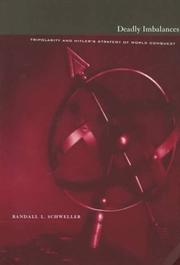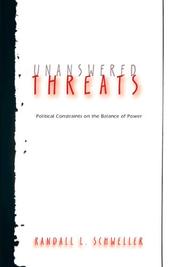| Listing 1 - 3 of 3 |
Sort by
|

ISBN: 0231110731 0231110723 9780231110730 9780231110723 Year: 1998 Publisher: New York Columbia University Press
Abstract | Keywords | Export | Availability | Bookmark
 Loading...
Loading...Choose an application
- Reference Manager
- EndNote
- RefWorks (Direct export to RefWorks)
Scholars frequently portray World War II as an epic morality play driven by a villain (Hitler) and a sinner (Chamberlain). This book offers a fresh approach, combining both the attributes of states and the structure of the international system to explain the origins and causes of World War II. Central to the analysis is the argument that the structure of the international system was tripolar - with Germany, the Soviet Union and the United States as the three central powers - and not multipolar and that this needs to be considered in any examination of the antecedent causes and crucial events of the war. Recognizing that both systems and human agents make history, the author presents an amended balance-of-power theory, a balance-of-interests theory - that distinguishes great powers by their relative material strength and the value they place on the status quo. This systems framework is used to examine and explain the dynamics of tripolar systems; how states respond to threats and opportunities; Hitler's strategy of global dominion; and the foreign policy strategies of the other major powers before and during the war.
Antithesis --- Balance des pouvoirs --- Balance of power --- Coexistence --- Contrariety --- Coëxistence pacifique --- Foreign affairs --- Foreign policy --- Interdependence of nations --- International relations --- Internationale betrekkingen --- Machtsevenwicht --- Opposites --- Ordre mondial --- Peaceful coexistence --- Polariteit --- Polarity --- Polarité --- Power [Balance of ] --- Power politics --- Puissances [Équilibre des ] --- Relations internationales --- Vreedzame coëxistentie --- Wereldorde --- World order --- Équilibre des pouvoirs --- Équilibre des puissances --- Équilibre international --- History as a science --- World history --- anno 1900-1999 --- 812 Ideologie --- 813 Methodologie --- 820 Internationale Betrekkingen --- 822.6 Militaire Bondgenootschappen --- 823 Diplomatie --- 826 Imperialisme, Kolonialisme --- 827 Geopolitiek --- 855.1 Strategie --- 855 Oorlogsvoering --- 882.4 Noord-Amerika --- 883.2 Oost-Azië --- 884.1 Oost-Europa --- 884.2 Noord-Europa --- 884.3 Zuid-Europa --- 884.4 West-Europa --- Dialectic --- Opposition, Theory of --- Foreign relations --- Global governance --- International affairs --- National security --- Sovereignty --- World politics --- Power, Balance of --- Political realism --- Polarity.

ISBN: 1282964976 9786612964978 1400837855 9781400837854 9780691136462 0691136467 0691124256 9780691124254 0691124256 Year: 2010 Publisher: Princeton, NJ
Abstract | Keywords | Export | Availability | Bookmark
 Loading...
Loading...Choose an application
- Reference Manager
- EndNote
- RefWorks (Direct export to RefWorks)
Why have states throughout history regularly underestimated dangers to their survival? Why have some states been able to mobilize their material resources effectively to balance against threats, while others have not been able to do so? The phenomenon of "underbalancing" is a common but woefully underexamined behavior in international politics. Underbalancing occurs when states fail to recognize dangerous threats, choose not to react to them, or respond in paltry and imprudent ways. It is a response that directly contradicts the core prediction of structural realism's balance-of-power theory--that states motivated to survive as autonomous entities are coherent actors that, when confronted by dangerous threats, act to restore the disrupted balance by creating alliances or increasing their military capabilities, or, in some cases, a combination of both. Consistent with the new wave of neoclassical realist research, Unanswered Threats offers a theory of underbalancing based on four domestic-level variables--elite consensus, elite cohesion, social cohesion, and regime/government vulnerability--that channel, mediate, and redirect policy responses to external pressures and incentives. The theory yields five causal schemes for underbalancing behavior, which are tested against the cases of interwar Britain and France, France from 1877 to 1913, and the War of the Triple Alliance (1864-1870) that pitted tiny Paraguay against Brazil, Argentina, and Uruguay. Randall Schweller concludes that those most likely to underbalance are incoherent, fragmented states whose elites are constrained by political considerations.
Balance of power --- Power, Balance of --- Power politics --- International relations --- Political realism --- History. --- #SBIB:327.6H00 --- #SBIB:93H3 --- History --- Internationale en diplomatieke relaties: algemeen --- Thematische geschiedenis --- Equilibre des puissances --- Histoire --- Balance of power - History --- Balance of power - Case studies --- Equilibre des puissances - Histoire --- Equilibre des puissances - Cas, Etudes de
Book
ISBN: 1421412780 9781421412788 9781421412771 1421412772 Year: 2014 Publisher: Baltimore, Maryland
Abstract | Keywords | Export | Availability | Bookmark
 Loading...
Loading...Choose an application
- Reference Manager
- EndNote
- RefWorks (Direct export to RefWorks)
Twenty-first century --- International organization --- International relations --- World politics --- Federation, International --- Global governance --- Interdependence of nations --- International administration --- International federation --- Organization, International --- World federation --- World government --- World order --- World organization --- Congresses and conventions --- Peace --- Political science --- International agencies --- International cooperation --- Security, International --- Forecasting --- Forecasting.
| Listing 1 - 3 of 3 |
Sort by
|

 Search
Search Feedback
Feedback About UniCat
About UniCat  Help
Help News
News